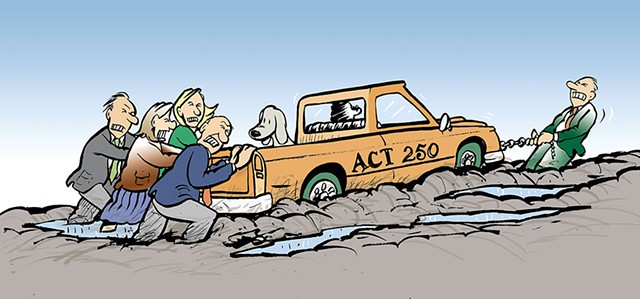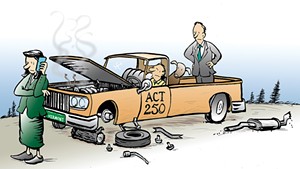
- Tim Newcomb
During a break from an afternoon of highly technical testimony last week about how to modernize Act 250, Vermont's landmark land-use law, Rep. Chris Bates (D-Bennington) shuffled back toward the committee room like a man condemned.
"I don't want to go back in there," Bates said, his eyes wide with bewilderment. "Most of this is literally over my head."
Bates and fellow members of the House Natural Resources, Fish and Wildlife Committee have been struggling for much of the legislative session to understand and reach agreement on how to update the nearly 50-year-old law.
So far, they have little to show for it. Despite pledges from legislative leaders and Gov. Phil Scott to prioritize the effort this session, it now appears unlikely that the House committee, let alone the full legislature, will be able to complete its work this year — disappointing, but not surprising, many onlookers.
Some of the proposed changes are so consequential and controversial that hammering them out in a single session always struck some as unlikely. Among other issues, the committee is grappling with whether and how Act 250 should address climate change, discourage forest fragmentation, better protect sensitive habitats and promote city-centered development.
"Each and every one of these [changes] is ... a hugely complex undertaking with decades of history behind it," said Warren Coleman, a former general counsel for the state Agency of Natural Resources who is now lobbying the committee on behalf of Burlington-based Pomerleau Real Estate. "So trying to tackle all of them simultaneously is a Herculean task."
Since 1970, Act 250 has required residential and commercial developments over a certain size to demonstrate that they will not unduly harm the environment or overburden community services. Outright permit denials have been rare. Commonly, however, regional citizen panels have mandated steps to mitigate a development's impacts.
Almost since the day it became law, Act 250 has been a battleground, with supporters arguing that it has saved Vermont from rampant, shoddy development, and critics holding that it has constrained growth and discouraged new businesses.
"Whenever changing [Act 250] comes up, the developers scream, the environmentalists scream, the lawyers scream and the judges scream," said Ed Larson, a lobbyist for the Vermont Forest Products Association.
Developers want more predictability, environmentalists want more enforcement, and property owners want to protect their rights and equity, he said.
This year those disagreements have centered on proposals to add 21st century environmental threats to Act 250's oversight.
While other bills, such as a proposed tax on fuel to fund weatherization efforts or electric vehicle purchase incentives, are sometimes seen as more directly addressing climate change, the Act 250 update is this session's "sleeper bill" on the issue, said Rep. Amy Sheldon (D-Middlebury), who chairs the House Natural Resources Committee.
Encouraging compact development near transit, limiting sprawl and protecting carbon-sequestering forests are all strategies Vermonters need to both address and adapt to a changing climate, according to Sheldon.
"If we don't develop better, we're not going to have the resources for us to have resilient communities," she said.
So, in 2017, lawmakers created a six-member, bipartisan Commission on Act 250 to explore ways in which the law could be amended to address the world of 2019 and beyond.
The commission spent more than a year doing so — consulting experts, holding public hearings across Vermont and drafting a sweeping set of changes.
But that work hasn't added up to speedy decision-making at the Statehouse, where most lawmakers aren't versed in the complexities of the proposed amendments. "There were six people on the commission. That means there are 174 who weren't," Sen. Chris Bray (D-Addison) said, referring to the 180 legislators who must OK any revisions to Act 250.
Bray, who chairs the Senate Natural Resources and Energy Committee, said the pace of the House panel's work is appropriate.
"To me, Act 250 is like the state's DNA. We should be very careful with the genome," Bray said. Even if the House doesn't send the modernization bill to the Senate until early 2020, he said, the upper chamber could act before the two-year legislative session ends.
Scott's administration has sought more modest revisions to the law, changes largely meant to streamline and bring consistency to the development review process.
One administrative priority is to exempt from Act 250 downtown areas that already have robust environmental rules. Rep. Charles Kimbell (D-Woodstock) introduced a bill that incorporates many of the administration's ideas, but the measure has yet to receive much attention from Sheldon's committee.
While she is intimately familiar with the subject from her time as chair of the Commission on Act 250, Sheldon said her fellow committee members, several of whom are new to the committee, have needed extra time to educate themselves.
The committee's work also has been slowed by familiar dilemmas and disagreements over how specific proposed changes would affect various interest groups.
For example, environmentalists — led by the Vermont Natural Resources Council — want Act 250 to make it more difficult to chop up blocks of forest into smaller lots.
VNRC and others have long argued that Act 250 falls short because it doesn't apply to the vast majority of residential development. Builders have learned how to keep most projects below the 10-acre size that typically triggers review under the law.
"We are chipping away at our forests and working lands though fragmentation. It's extremely well documented," said VNRC executive director Brian Shupe.
Environmentalists also support a proposed change that would trigger Act 250 review based on a project's location, regardless of its size. All developments in sensitive ecological areas such as river corridors or above 2,000 feet in elevation would qualify. Projects above 2,500 feet are already automatically reviewed.
But forestry interests have pushed back hard against these changes. Larson, the forest industry lobbyist, said there are important open questions, such as whether a wetland in one corner of a lot should trigger Act 250 review for a project in the opposite, upland corner.
He also argued that loggers are already required to obtain water quality and other permits. Adding Act 250 review would create "over-the-top duplication" that would further burden an already struggling industry, he said. If Vermont puts any more stress on timberland owners, they'll just become more likely to subdivide and sell their land to make ends meet, he said.
"I told them that this could backfire and actually accelerate fragmentation," Larson said.
Scott, meanwhile, has stressed the importance of eliminating redundant planning and permitting efforts, particularly in downtowns that now have far more restrictive zoning rules than when Act 250 was first passed.
Similar intense arguments have sprung up around the proposal to remove the exemption that excuses slate quarries from Act 250 review.
Rep. Jim McCullough (D-Williston) said he felt sympathy for the hard-working families that own and work at slate quarries. But he said that neighbors' concerns about noise and other impacts "pulled at our heartstrings," while aerial images of the slate quarries in at least one town, Pawlet, showed they were "getting a total pass."
"It looks like a demilitarized zone, and it's totally without oversight," McCullough said during a committee hearing last week, adding that he worries about impacts from unregulated expansion of the slate industry in coming years.
"It's an environmental issue as well as a human issue," he said.
That prompted Rep. Leland Morgan (R-Milton) to rebut the suggestion that there are any environmental problems with slate quarries.
"Other than aesthetics, we really don't know it's having any detrimental effects on anything," Morgan said.
Ideological divisions on the committee are also simmering over how to handle appeals of Act 250 decisions made by the nine citizen-led district environmental commissions.
It's not a new point of contention in Vermont. After years of argument, lawmakers in 2005 abolished the citizen body that heard appeals and gave the responsibility to the court system.
The House Natural Resources Committee is now considering a reversal of that choice, in the name of an appeals process that is faster, less expensive and more accessible to residents than are the courts. Lawmakers have been trying to structure a new citizen panel of five citizens with land-use and environmental law experience to hear appeals.
But critics argue the change is unnecessary and say there is no evidence it'll be cheaper or faster. Bob Paolini, an attorney who represents the Vermont Bar Association, called the idea "an attack on the judiciary, and I just don't think it's warranted."
The debate over the complexities of reforming the appellate process was the subject Bates dreaded returning to last week. In the committee room he shook his head, rolled his eyes and pulled his fingers through his hair.
"I have no idea what they are forming because I have no idea what it was before," Bates said outside the room.
To fill the void, the committee has turned to lawyer-lobbyists with experience in Act 250.
Asked last week about new draft language on the appeals process, legislative lawyer Ellen Czajkowski, who is also new to the committee, turned to Jon Groveman, a past general counsel for the Agency of Natural Resources who now lobbies for VNRC. He acknowledged that he had drafted the language the night before.
Whether evidence of careful deliberation or legislative dysfunction, the pace has proven frustrating for environmental groups that thought the momentum from the Commission on Act 250 would carry over into the legislative process.
"I was hoping that it could have gone quickly, but I think that was naïve," Shupe said.
Sheldon urged patience. With the work of educating her members largely done, she said, the panel has begun making some key decisions. Last Friday, for example, the committee referred the portion involving the new appeal process to the House Judiciary Committee for its input, though it's unclear how quickly that committee will take it up.
"I have the philosophy of let's go slow to go fast," Sheldon said.












Comments (10)
Showing 1-10 of 10
Comments are closed.
From 2014-2020, Seven Days allowed readers to comment on all stories posted on our website. While we've appreciated the suggestions and insights, right now Seven Days is prioritizing our core mission — producing high-quality, responsible local journalism — over moderating online debates between readers.
To criticize, correct or praise our reporting, please send us a letter to the editor or send us a tip. We’ll check it out and report the results.
Online comments may return when we have better tech tools for managing them. Thanks for reading.